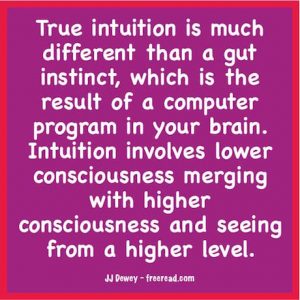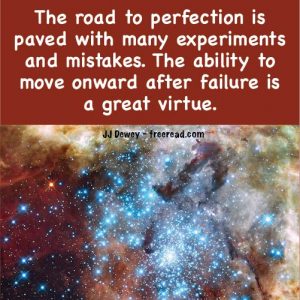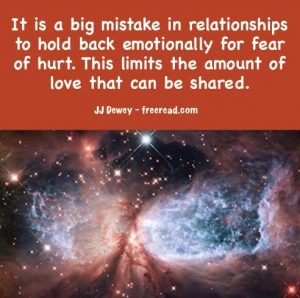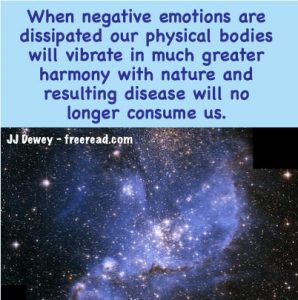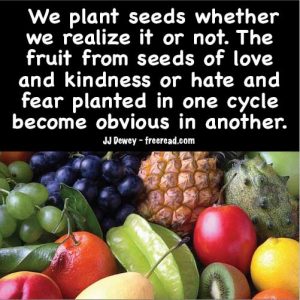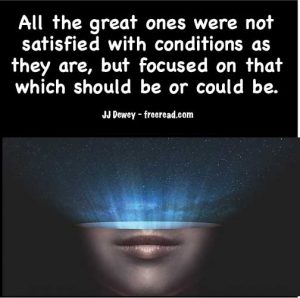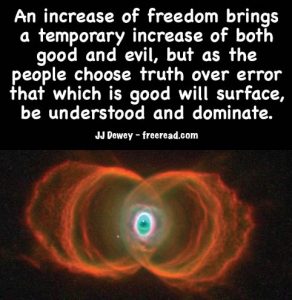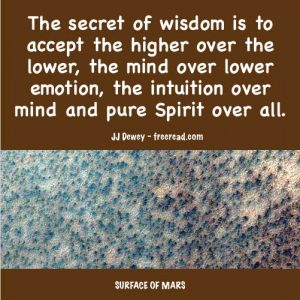
Intuition and Domination
A reader comments that my posts present a much different view of the intuition than she formally believed it to be. She says: “Lordy, I have no idea. I’m starting to wonder if my entire life has been based off of decisions made by some primordial past…”
Your honestly here is refreshing and amusing (in a good way). If the discussion here can awaken us to a realization of what we do not know and that which is yet unrealized then we have the beginning of new knowledge and an additional step on the Path. Sometimes our notions have to be destroyed before greater truth can enter in.
As I said, the trouble with DK and other teachers using the word “intuition” in teaching esoteric writings is that many a reader will go by the common meaning of the term. According to the common meaning, just about all have used intuition at one time or another. But in the context that DK uses it only a handful have a grasp of it and a very small handful are polarized in the intuition.
As I said, the first step in entering the intuitive consciousness is in exploring the world of ideas. This corresponds somewhat to DK’s comments on illumination. The more illuminated is the mind by the soul the greater the power to bring down inspired ideas.
Does the average seeker touch intuitive consciousness at all or is it just beyond his grasp?
There is much about the intuitive consciousness that is beyond the current reach of the average seeker. Even though this is so, it is good for all of us to have the carrot of the next few steps dangling before us to contemplate. This stimulates us and helps us progress faster.
Even though much is beyond the current experience of aspirants many have also gotten their big toes wet with their intuition.
This happens first with the world of ideas.
Are all ideas then from intuitive consciousness?
No. Some of what is called ideas are from deductive reasoning. Some people merely put two and two together and call it an idea. Instead this would technically be a deduction.
A true intuitive idea is one that comes, almost in a flash of light, that is sensed by the individual as being something beyond the ability of the reasoning mind to automatically produce from available facts.
So how have those in this group used the intuition?
Actually, the most common way to begin the development of intuitive consciousness is through writing, just as we are doing here.
How many times have you read of some inspired idea or concept put into writing by a member of the group and it just seemed to speak to you? You might think something posted just seemed extra inspired today. There is a good chance that the writer tapped into the intuition.
Poetry and song writing is another creative avenue that stimulates intuition. Actually, any creative endeavor that allows the seeker to manifest the “new” and the good and the beautiful is great training ground for the development of true intuition.
There is, however, some distance to go before one becomes polarized in intuitive consciousness. In order to do this one must understand the language of the soul which is based upon principles and not words. The intuitive will always look for the principle behind all things. DK expressed this as “the divine germ seen as latent in all forms.”
“We have survived by hiding from them…by running from them. But they are the gatekeepers. They are guarding all the doors, they are holding all the keys, and that means that sooner or later, someone is going to have to fight them.” Morpheus – The Matrix
The question: Because many decisions do not require intuitive thought. Some decisions may benefit from the intuition and others may not.
Since decision is the key to polarization but not all decisions can be based on intuition, then how does the intuition govern decision-making in the life of the intuitive?
To explain the answer perhaps it would be best to introduce a new principle that we shall call the “Principle of Domination.”
It could be expressed this way as far as consciousness goes. “That consciousness wherein lies the major focus of attention (polarization) will dominate decision-making. If the lower dominates the higher, then creation comes to an end and dissolution comes into play. The dominating force seeks to control all. When the higher dominates the lower (which is its destiny to do), creation begins anew and force is only used when all that is lower fails.”
The key phrase here is “force is only used when all that is lower fails.”
When the mental dominates it will allow the emotions to have their way until common sense dictates that the entity is making an error. When this occurs the mind will assume control and dominate by force of will.
But for the emotionally polarized the situation is different. As soon as the emotions detect the emergence of higher mind and logic, they will do all in their power to dominate in every situation and dominate every decision whether it makes sense or not.
If the intuition dominates the mind as well as the emotions then the intuitive self will allow mind to make any decision it wants that is in harmony with that which is perceived intuitively. In turn, the mind will allow emotion to have its way as long as logic is not violated. Again, emotion will acquiesce to instinct as long as it feels right.
The only time the intuitive self assumes control is when the lower bodies begin to pull self in a direction contrary to that which the intuition sees. If all is going well it would seem that the intuition is not in control, for the mind and feelings seem to be making most of the decisions. It is only when a wrong direction is felt or thought that they learn who is really in charge.
Thus we see that all the parts of ourselves still influence the decision-making process for decision is always acquiesced to the level where the decision is most appropriate.
Example: Bob meets Carol. He finds her beautiful and instinct says yes. Pursue her.
Emotion says: “Let’s get to know her a while to see if I approve.”
Bob takes Carol on a couple dates and emotion begins to fall in love and heartily approves of instinct.
Mind then enters in and says: “She may be good looking and we are attracted to her, but does the relationship make sense?” Mind then studies Carol and the potential relationship and sees a number of problems. A number of their core values and interests are different. Mind then pulls the plug.
Instinct and emotion are very upset.
But the intuitional self is assessing the situation and it perceives that despite the differences that Carol would be an asset to Bob in accomplishing his life’s mission. Intuition then overrides the mind and makes the decision to pursue the relationship.
Of course this scenario can only take place when consciousness is dominated by intuition. Over 90% of humanity is dominated by emotion so this decision-making process normally does not even reach the stage of mind.
The second part of the question was: Can you give an example of a time that intuition helped you make a decision?
A reader gave a good example of an intuitional conclusion.
She basically tells us that those in the West seem to have greater spiritual values than those in the Eastern States because those in the West are descended from the pioneers who came west in search for a better life. Of course there are good people everywhere, but she deserves credit for touching on the intuition because she touches on a principle.
What is that?
It is the Gathering Principle.
Periodically in earth’s history the lights are gathered through a desire to seek a better life. When this occurs the benefits will last for several generations.
Assignment:
Give one or more characteristics that apply to the intuitional self, but do not apply to the emotional or mental selves.
Trinity: You told me to never get on the freeway. You said it was suicide.
Morpheous: Then let us hope that I was wrong. Matrix Reloaded
June 3, 2003
Copyright by J J Dewey
Easy Access to All the Writings
For Free Book go HERE and other books HERE
JJ’s Amazon page HERE
Gather with JJ on Facebook HERE
